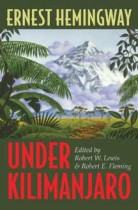Archetypal Figures in “The Snows of Kilimanjaro”
Hemingway on Flight and Hospitality
Literature & Literary CriticismDavid L. Anderson
Hemingway’s short story, “The Snows of Kilimanjaro,” has secured a place among the greatest works in that genre—the story is widely considered Hemingway’s greatest. To explore the richness of this work, David L. Anderson returns to a somewhat unusual approach, that of archetypal criticism, which allows us to examine the story in more universal, rather than strictly historical, ways.
Anderson emphasizes the story’s theme of hospitality, which dramatizes topics of community and human interdependency, and notes that this illuminates a fundamental human impulse to shelter or aid those in need. Borrowing from Jack London, Anderson relates this to the archetype of the “man on trail”: one who is being pursued, ultimately by death, and is in need of hospitality, a friend.
Anderson explores the man-on-trail archetype extensively in the Italicized Memory sections of the story, in the drama of Harry’s last day, and in the unforgettable ending section as Harry takes his flight to Kilimanjaro. Analysis of Harry’s memories can no longer purport to be complete, definitive, or even useful without considering Anderson’s astute analysis.





